As the Democratic nominating process ends with a whimper, not a bang, Democrats need to take steps to finally get rid of Iowa and New Hampshire’s protected status as the first two contests. With their presumptive nominee, Joe Biden, not beholden to voters in either of those two states for his sweeping victory, the August convention can finally get rid of traditions that no longer reflect the realities of today’s Democratic Party. As Gilberto Hinojosa, chairman of the Texas Democratic Party said of the current primary calendar, “It is bizarre. It makes absolutely no sense except for tradition, and sometimes tradition doesn’t get us anywhere.”
The party’s freedom to upend this particular tradition has been circumscribed in the recent past by the influence of nominees who owed their national success to their showing in the early primary contests, which are conducted almost entirely among white, rural and small-town voters, a group that no longer reflects the composition of today’s Democratic Party. [1]
The two states’ demographically distorted electorates would be reason enough for Democrats to take away their special status in the nominating process. But their unique status also goes against the Democratic Party’s commitment to participation and transparency. As Sean McElwee, a dyed-in-the-wool Bernie Sanders supporter and founder of the polling and policy group Data for Progress, pointed out after this year’s contests were over, “the early states were disproportionately caucus states and disproportionately white, which papered over some worrying political weaknesses for progressives.”
Iowa’s complex caucus process is notoriously opaque and difficult for all but an inner circle of initiates to navigate. The rules changes the Democratic National Committee instituted this year, at the urging of Sanders supporters, ended up making matters worse. Forced by the new rules to report three different types of results from more than 1000 caucus sites, the party found itself without the technology to do so. This simultaneously ruined the state Democratic Party’s reputation, caused the media to dismiss the results as unknowable and possibly suspect, and denied the surprising winner, Mayor Pete Buttigieg, much of the momentum from what turned out to be his only win (or maybe tie) in the entire nominating process.
New Hampshire’s delegate selection process is at least a primary with results that are known on Election Day. However, it takes openness to an extreme, allowing not only independent voters but registered Republicans to vote on which candidate the Democratic Party should nominate for president. And it can hardly claim that those who do participate have any unique insight on who the Democrats should nominate to win the presidency, since it has been over forty years since the winner of any contested New Hampshire Democratic primary (Jimmy Carter in 1976) has been elected president.
Incumbent presidents have felt obligated to defend keeping Iowa and New Hampshire first in the nominating process as a way of saying thank you to the voters in those states who provided them a successful launching pad. In addition, incumbent presidents have been hesitant to challenge the “first in the nation” status of Iowa and New Hampshire to make sure no one from those states organized an early challenge to their renomination out of parochial concerns about a possible loss of that status. For example, when I was Chairman of the DNC’s Commission on Presidential Primaries and Delegate selection, often referred to as the Winograd Commission, any hint of a rules change that would keep Iowa from being the first contest in the process was quickly shot down by President Jimmy Carter’s supporters on the Commission—at the instruction of the White House. President Bill Clinton, whose second-place finish in New Hampshire in 1992 gave him his “comeback kid” reputation, made sure that no one at the DNC ever hinted at taking away that state’s legislative mandate that its primary take place at least one week earlier than any other. President Barack Obama, who emerged from obscurity to win Iowa in 2008, was equally uninterested in changing that state’s status for 2012.
These political considerations are likely no longer operative. Joe Biden lost both Iowa and New Hampshire. For the first time in decades, the underlying weaknesses of the nature of the Iowa and New Hampshire contests will make it much more difficult for those states to retain their current role once a fairer, more representative alternative is presented and implemented.
What is the alternative?
Democrats should use this unique opportunity to create a national Democratic Primary to be held the week after Easter every four years, starting in 2024. There are two standard arguments against such an arrangement, but only one of them still carries any weight.
Traditionalists argue that party insiders’ knowledge of the potential candidates can play an important role in selecting a winning nominee. But the inability of party leaders to impact the nominating process has already been tacitly acknowledged by the DNC rules change on super delegate voting at this year’s convention.[2] This year they were banned from voting on the first ballot, while keeping their theoretical ability to resolve any convention deadlock on the second ballot. Because no Democratic convention has gone beyond the first ballot since national conventions have been televised, the need to find a way to protect the influence of party leaders on the final outcome by not moving to a national primary hardly qualifies as a realistic argument against the idea, even if it remains the favorite hobby-horse of party elites.
The real problem a national primary presents is the difficulty it theoretically creates for a candidate with minimal name recognition to mount a winning nationwide campaign against candidates who are already well-known to the electorate. If Democrats, it is argued, were to eliminate the ability to campaign early in small states such as Iowa and New Hampshire, they would still need to create some kind of initial campaign test that doesn’t require an underdog to launch a national campaign from a standing start. The argument is a valid one, but it can easily be incorporated into a scheme for a national primary that simultaneously preserves the role of the current earliest four states to help the rest of the country focus in on a potential winning candidate. Here’s how:
First, the DNC should finish the job it started in 2020 and completely abolish the ability of any state to determine the preferences of its Democratic voters by holding a poorly attended and very unrepresentative caucus gathering. Outside of Iowa, no state should object. This year three key, big states—Colorado, Washington and Minnesota—took the party’s hint and converted their caucuses to primaries. This left only Iowa, Nevada and four small states with caucuses. Only Iowa and Nevada, because of their early positions, were the ones that theoretically could have an impact on the nomination. To their credit, Nevada Democratic Party leaders have already signaled their dissatisfaction with their caucus’s process (not outcome) and are ready to use their newfound domination of the state’s government to enact a primary for 2024, leaving only Iowa to defend its parochial interests in preserving its traditional role.
Once that first step is taken, it is easy to finish the makeover of the Democratic nomination process by creating a primary process more suited to today’s 24-hour cable news and social media era. To make sure initial debates about policy include the concerns of key Democratic constituencies—such as Hispanics in Nevada and African-Americans in South Carolina—while respecting the contribution voters in Iowa and New Hampshire have made in the past, all four of the current early states should be given the opportunity by the rules committee of this year’s Democratic National Convention to hold their 2024 Democratic presidential primary on the same date: Sunday, March 10, 2024. Candidates that do well in one or more of those early contests will have ample time to leverage those victories to acquaint the rest of the country’s Democratic voters with their vision, values and policies by designating Sunday, April 7 2024 (the week after Easter) as National Democratic Primary Day.
The offer to each of the four states to retain some of their early prominence should come from the DNC with a condition that none of them seek to become “more first” than any other state. If any state decides to jump the gun, the DNC rules should disqualify the results in calculating the winner of the nomination and refuse to seat any delegation chosen based on those results. The “vacancy” caused by any such flouting of the rules by a state that went too early would be filled by another relatively small state from the same region of the country which is prepared to abide by the rules. In this way, the ability of a candidate, such as John F. Kennedy or Barack Obama, to make an early and surprisingly good impression will be preserved by providing them the ability to campaign for a month among a total electorate about the size of Columbus, Ohio.
It is likely that New Hampshire would not only object to this new primary calendar but point to the legislative mandate its state legislature has given to the state’s secretary of state to set the date for its primary at least one week before any other state’s primary. They could choose to hold such a “beauty contest” they wanted to, but its outcome would have nothing to do with votes at the Democratic National Convention.
This relatively simple two-step process for establishing a Democratic National Primary Day would greatly enhance the public’s acceptance of the outcome. Although no set of rules can guarantee the selection of a presidential nominee who is prepared to meet the challenges the country now faces, by increasing the participation of as many Democrats as possible in an open process that better reflects the makeup of today’s Democratic coalition, the party can improve the odds that its next nominee will win the prize national politicians dream about winning.
[1] According to Pew Research Center’s 2018 report on party identification, whites make up 59 percent of all Democratic identifiers nationally, Hispanics 19 percent, African Americans 12 percent, and Asian-Americans 8 percent. Despite this distribution among Democratic voters, the current Democratic nominating calendar gives the disproportionately white electorates of Iowa and New Hampshire an outsize influence on which candidate the Democratic Party should choose for president. Iowa’s population is 80 percent white; New Hampshire’s is 90 percent. Only six percent of Iowans are Hispanic, a percentage still twice that of their representation among residents of New Hampshire. African Americans make up three percent of Iowa’s population. Their numbers aren’t even that large in New Hampshire. The two states’ demographics are uniquely unsuited to providing insights on the beliefs and concerns of the various constituencies that Democrats will need to attract and turn out in November.
[2] Super delegates are party leaders or elected officials who are free to vote for any candidate regardless of the results of the popular vote in primary elections and caucuses preceding the convention.
The Brookings Institution is committed to quality, independence, and impact.
We are supported by a diverse array of funders. In line with our values and policies, each Brookings publication represents the sole views of its author(s).

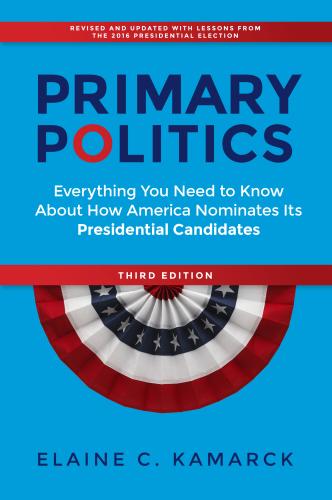
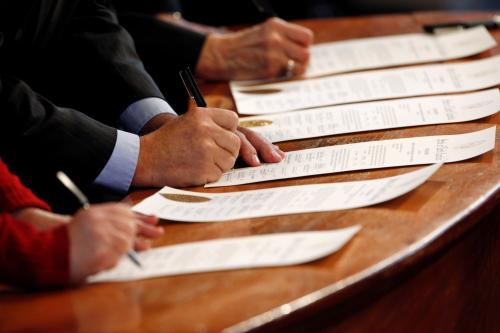
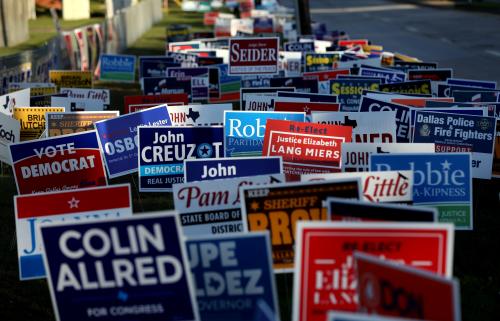


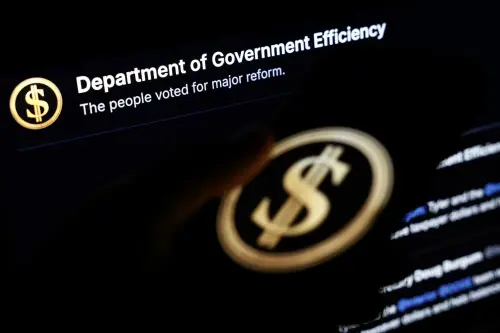
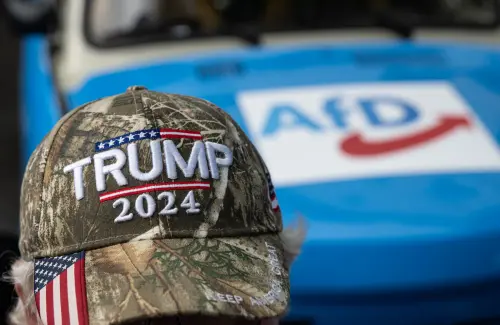
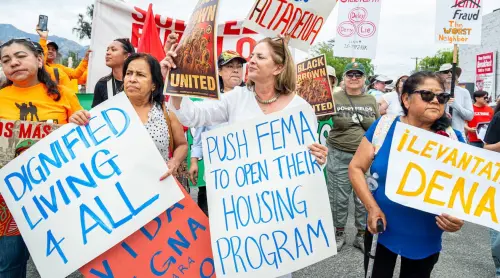
Commentary
It’s time to fix Democrats’ Iowa and New Hampshire problem
May 26, 2020